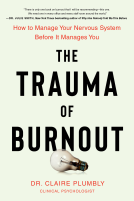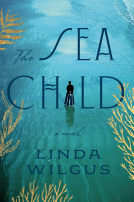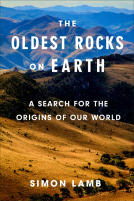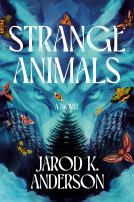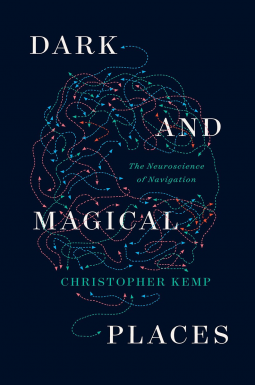
Dark and Magical Places
The Neuroscience of Navigation
by Christopher Kemp
This title was previously available on NetGalley and is now archived.
Send NetGalley books directly to your Kindle or Kindle app
1
To read on a Kindle or Kindle app, please add kindle@netgalley.com as an approved email address to receive files in your Amazon account. Click here for step-by-step instructions.
2
Also find your Kindle email address within your Amazon account, and enter it here.
Pub Date Jan 25 2022 | Archive Date Dec 31 2021
Talking about this book? Use #DarkandMagicalPlaces #NetGalley. More hashtag tips!
Description
An illuminating examination of how the brain helps us to understand and navigate space—and why, sometimes, it doesn’t work the way it should.
Navigation is one of the most complex tasks our brains perform. And we do it countless times a day—as we drive across town to the airport, or traverse the maze of a supermarket, or walk within our own homes. But why is it that some people are lost on their own street and others can seamlessly navigate a new city after visiting it once?
Fueled by his own spatial shortcomings, Christopher Kemp describes the brain regions that orient us in space and the specialized neurons—place cells and grid cells—that do it. He explains how the brain plans routes, recognizes landmarks, and makes sure we leave a room through a door instead of a painting. Along the way, he meets the scientists trying to understand the mental maps of modern humans, and Neanderthals, and lost people everywhere. Dark and Magical Places is an informed and entertaining journey into the mysteries of the mind.
Advance Praise
"Chris Kemp may not be able to find his way out of a stairwell, but he has quickly and with no false turns made his way to the top of my list of favorite science writers. For all his navigational shortcomings, Kemp is an expert guide to the most complex landscape of all: the human brain. He's a natural storyteller, a deft explainer, and a terrific and funny writer." - Mary Roach, author of Gulp
"Christopher Kemp’s brilliant and beguiling new book reveals that behind the curtain of the seemingly quotidian act of traversing space lies an array of intricate neuroscientific magic tricks, temporal feats of strength, hiccups, and elusive mysteries that only the human brain can contain.... Like the brain itself, Kemp’s wild writing quakes and sparks, uncovering the lyric lurking in the neuroscientific, the hilarious in the incantatory." - Matthew Gavin Frank, author of Flight of the Diamond Smugglers
"Christopher Kemp’s captivating exploration of the brain’s hippocampus and its seemingly magical powers will alter the way you see and move through the world. As both scientist and scribe, Kemp brings his gifts of curiosity and intelligence to bear on the topic of navigation and shows us that there is no shame in being lost. On the contrary, Kemp demonstrates that to be continuously and authentically in search of our place on earth is a wondrous thing." - M. R. O’Connor, author of Wayfinding
"As a person who often finds myself lost in cities and forests alike, I was thrilled to discover this book, a dazzling—at times dizzying—exploration of brains and places, how they trouble one another and how they a give one another meaning." - Robert Moor, bestselling author of On Trails
"A fascinating and sneakily amusing book.... Christopher Kemp is an elegant and quick-witted writer who, feeling perpetually and hopelessly lost himself, is perfectly qualified to lead us through some of the most complicated and discombobulating corners of human cognition." - John Mooallem, author of This is Chance!
Available Editions
| EDITION | Hardcover |
| ISBN | 9781324005384 |
| PRICE | $26.95 (USD) |
Average rating from 6 members
Featured Reviews
 Anna L, Librarian
Anna L, Librarian
The subtitle to this book is actually the main subject of “Dark and Magical Places”. Focus on “The Neuroscience of Navigation” because you will read a lot about how different parts of the brain are involved in how we find our way around. The author, Christopher Kemp, admits that he has gotten lost driving in his own neighborhood; passed his own house. Kemp tells the stories of people who have gotten lost and were never found alive again. And some who were found weeks later, alive. The questions is, “Why are some people clueless about navigating their world and others have no problems whatsoever?” Neuroscientists have done research, which is ongoing, on this question and discovered brain regions that work together to help us navigate. Much of the book takes concentration to really grasp the discussions on the brain but you will find that one of the tips to being a better navigator is to pay attention. Read the book and do both.
 Bill C, Reviewer
Bill C, Reviewer
Once, driving with a friend from Rochester to New Orleans, I woke for my turn at the wheel to have my friend excitedly tell me we’d been making great time, as we were “less than an hour from Philadelphia.” Considering when we had left home, it was indeed “great time,” I told him. Unfortunately, I also had to tell him that Philadelphia was not even close to on the way to New Orleans, and that he’d been speeding in the wrong direction for the last few hours. Similarly, on another trip down south, I woke up to my wife very proudly informing me we were just coming into the city limits. Which would have been wonderful news, save for the minor detail that the city was Louisville, and we were going to Lexington.
I learned two things from these (and multiple other similar situations either driving or hiking). One, don’t ever fall asleep. Two, not everyone has the same sense of their place in the world as I do.
In Dark and Magical Places: The Neuroscience of Navigation, Christopher Kemp tries to find out why that is. Why some people, like me or his wife, have an unerring sense of place and direction and others, like him and my wife and friend, have no idea at any given point where they are in relation to where they’re trying to go. In fact, Kemp’s spatial sense is so bad, he tells us in the introduction, that he is “permanently lost … If I were blindfolded and taken just a few block from my house … I’d be as lost as if I’d suddenly teleported to the outskirts of Reykjavik. It takes me only a few moments to become disoriented… Theme parks. Cities. My own street. Megastores … I’m lost all the time.”
What follows is a fascinating tour through the various parts of the brain and body (but mostly the brain) that work together to allow us to navigate our way through the world. Most of the work, it turns out, is done in the hippocampus, a small structure deep in the brain, which is heavily involved in memory (no surprise), but also in the creation of a “cognitive map”, which Kemp describes as “a model of the world; a record engine, an instruction manual; a pattern detector.” In one little tidbit you may have seen reported in the media, London cab drivers, who famously have to spend years memorizing all 25, 000 plus streets for a test known as “The Knowledge”, have much larger hippocampi than most people, including London bus drivers, who only have to learn a few routes.
Kemp also introduces us to “place cells” that fire to represent a specific location, head-direction cells that do just what you think based on their name, grid cells that create “a precise coordinate system, the same geometric … pattern whether I’m walking around my house or through a busy grocery store,” and several other specialized structures in the brain that contribute to navigational skill.
Just as fascinating as the anatomy are the various methods researchers use in their studies of humans and animals, the evolution of the various structures that make up our navigation system, and the ways in which the system can fail. Including how our technology, particularly GPS, has degraded our abilities. Some of these explorations come via clearly explained academic studies, others through more narrative style reporting, as when Kemp offers up stories of people who followed their GPS into the ocean, onto railroad tracks, into a swamp, etc. or who stepped off a hiking trail just far enough to relieve themselves or take a small rest and who then couldn’t find their way back to the trail only a few yards away. Some of these ended, if not happily, at least positively, as with the story that frames the book — Amanda Eller getting lost for 17 days in Makawao Forest Reserve in Hawaii before being spotted by a rescue copter. Other stories, sadly, end more tragically, as with Geraldine Largay left the Appalachian Trail in Maine to go to the bathroom, couldn’t find her way back to the trail, and died some time after, her body not found until two years later in a makeshift camp three different search teams had come within a hundred yards of.
The science in the book is detailed, but as Kemp notes in the intro this is not a textbook; it’s not dumbed down, but rather simplified and abridged. And as detailed and complicated as the navigational process is, Kemp is never anything but lucid, organized, methodical, up-to-date, (a number of cites are from 2019-2021) and clarifying. He also is good about making clear when scientists have direct evidence leading to a consensus solid conclusion and when researchers are detailing still-to-be-confirmed (or even agreed to) theories. The one place I thought the speculation or theorizing ran a little (and just a little) too far beyond the evidence was the discussion of the differences between we Homo sapiens and our close cousins the Neanderthals. But that was a minor quibble, if that.
Meanwhile, the science is perfectly balanced with the personal stories that pepper the work, and especially Kemp’s descriptions of his own major problems with navigation, which often add a welcome lighter tone amidst the more tragic or potentially tragic. This was a totally new topic for me, and I came away much more knowledgeable about the topic and with a clear, cogent understanding of the basic process of how we find our place in the world (at least, physically). I highly a lot, read the notes, and copy and pasted links for further reading- — all reliable signs of a strong non-fiction work. Strongly recommended.
4.5
Readers who liked this book also liked:
JUNO
Arts & Photography, Comics, Graphic Novels, Manga, Travel
Marie Bostwick
Historical Fiction, Literary Fiction, Women's Fiction




